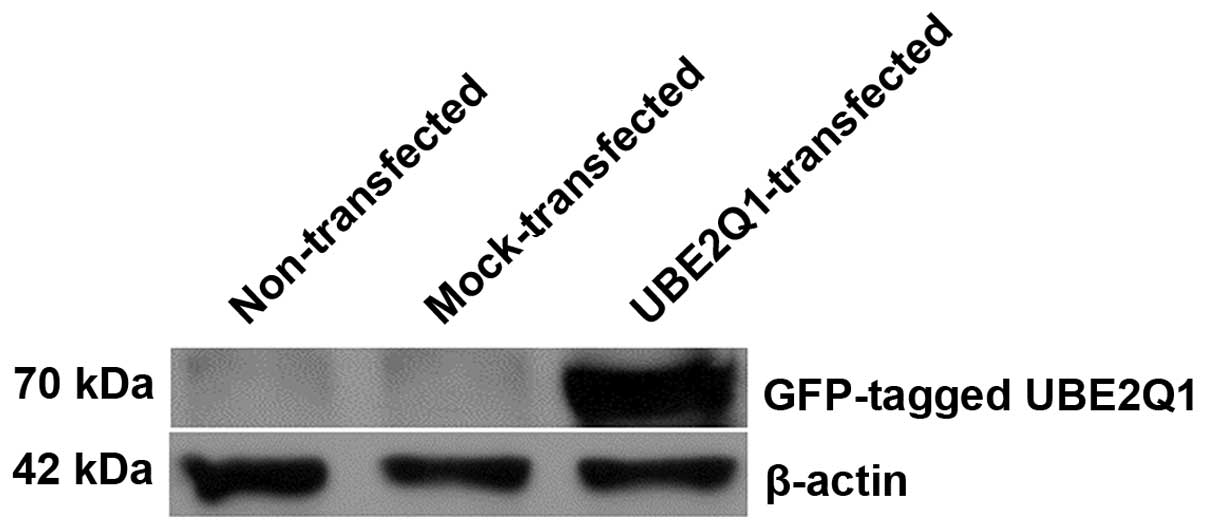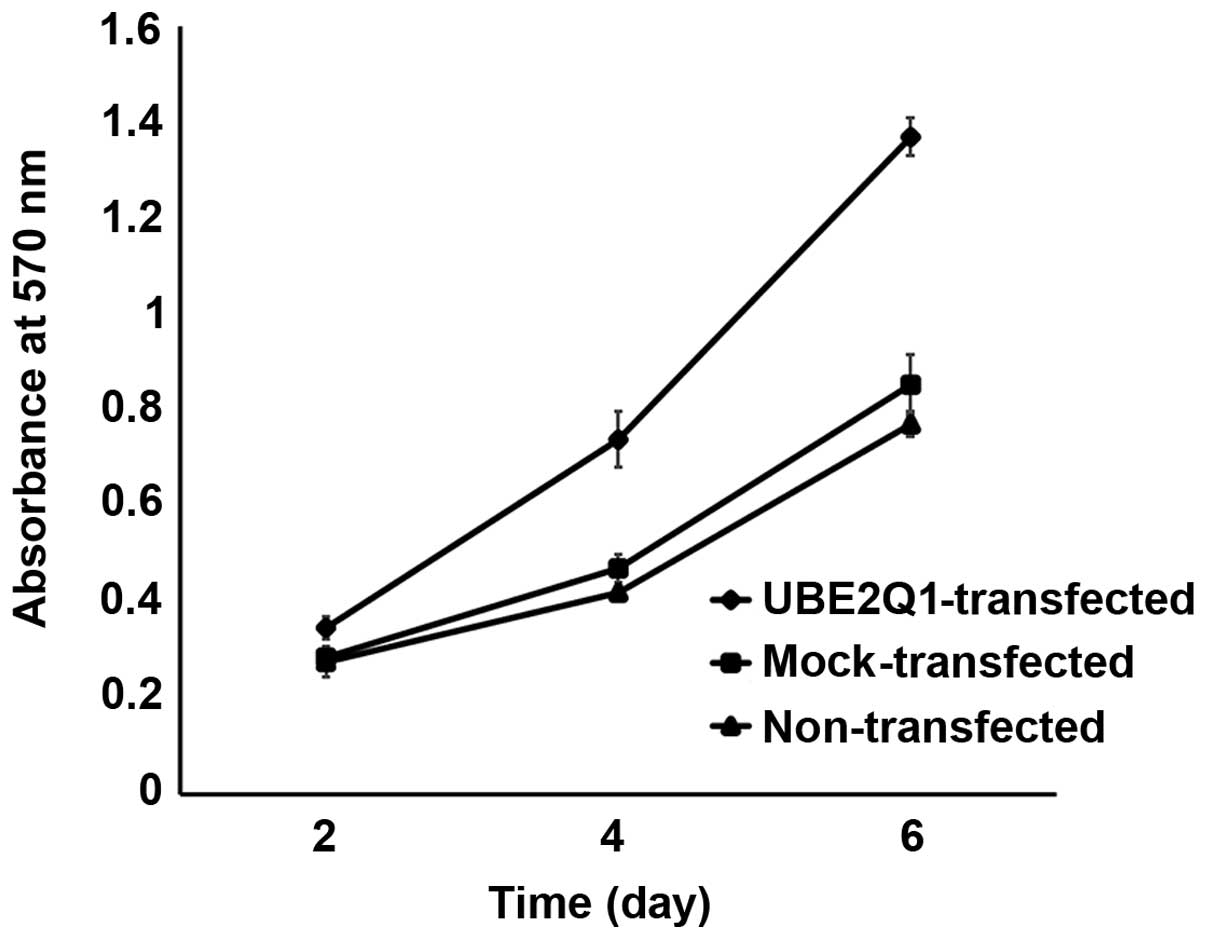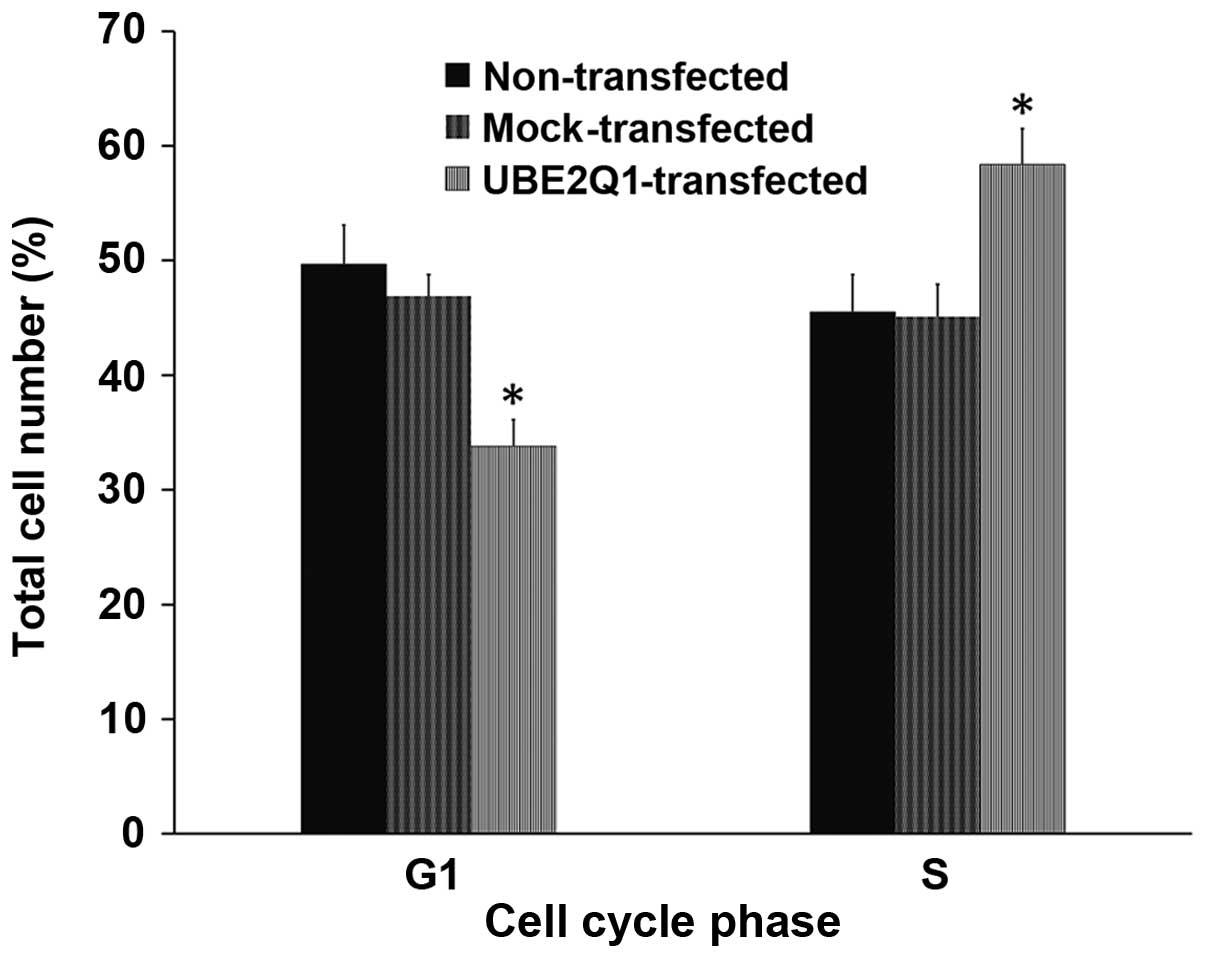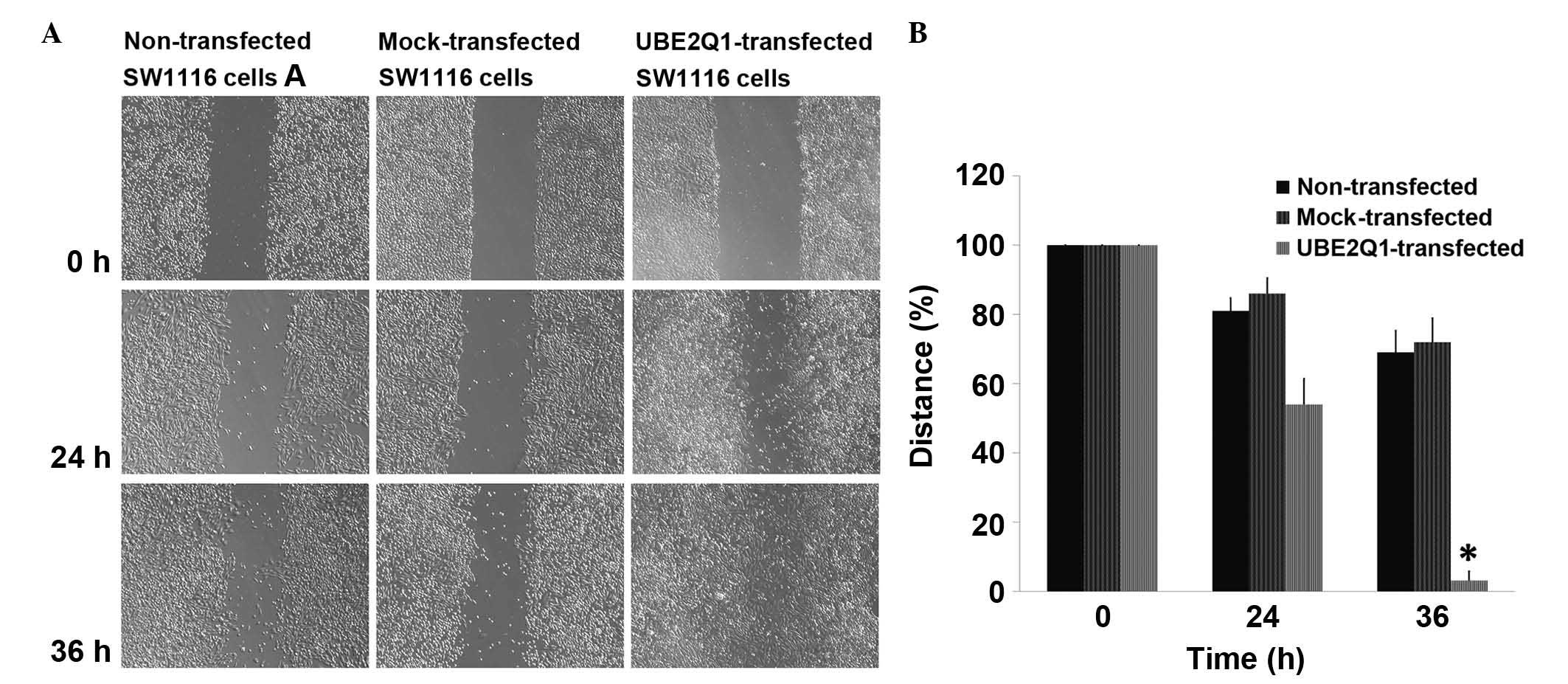|
1
|
Shen Z, Jiang X, Zeng C, Zheng S, Luo B,
Zeng Y, Ding R, Jiang H, He Q, Guo J and Jie W: High expression of
ubiquitin-conjugating enzyme 2C (UBE2C) correlates with
nasopharyngeal carcinoma progression. BMC Cancer. 13:1922013.
View Article : Google Scholar : PubMed/NCBI
|
|
2
|
Grzmil P, Altmann ME, Adham IM, Engel U,
Jarry H, Schweyer S, Wolf S, Mänz J and Engel W: Embryo
implantation failure and other reproductive defects in
Ube2q1-deficient female mice. Reproduction. 145:45–56. 2013.
View Article : Google Scholar : PubMed/NCBI
|
|
3
|
Nikseresht M, Seghatoleslam A, Monabati A,
Talei A, Ghalati FB and Owji AA: Overexpression of the novel human
gene, UBE2Q2, in breast cancer. Cancer Genet Cytogenet.
197:101–106. 2010. View Article : Google Scholar : PubMed/NCBI
|
|
4
|
Hershko A: The ubiquitin system for
protein degradation and some of its roles in the control of the
cell division cycle. Cell Death Differ. 12:1191–1197. 2005.
View Article : Google Scholar : PubMed/NCBI
|
|
5
|
Zhu D, Zhong Y, Wu H, Ye L, Wang J, Li Y,
Wei Y, Ren L, Xu B, Xu J and Qin X: Predicting metachronous liver
metastasis from colorectal cancer using serum proteomic
fingerprinting. J Surg Res. 184:861–866. 2013. View Article : Google Scholar : PubMed/NCBI
|
|
6
|
Zhou LH, Hu Q, Sui H, Ci SJ, Wang Y, Liu
X, Liu NN, Yin PH, Qin JM and Li Q: Tanshinone II-a inhibits
angiogenesis through down regulation of COX-2 in human colorectal
cancer. Asian Pac J Cancer Prev. 13:4453–4458. 2012. View Article : Google Scholar : PubMed/NCBI
|
|
7
|
Van Cutsem E, Borràs JM, Castells A,
Ciardiello F, Ducreux M, Haq A, Schmoll HJ and Tabernero J:
Improving outcomes in colorectal cancer: Where do we go from here?
Eur J Cancer. 49:2476–2485. 2013. View Article : Google Scholar : PubMed/NCBI
|
|
8
|
Kopetz S, Chang GJ, Overman MJ, Eng C,
Sargent DJ, Larson DW, Grothey A, Vauthey JN, Nagorney DM and
McWilliams RR: Improved survival in metastatic colorectal cancer is
associated with adoption of hepatic resection and improved
chemotherapy. J Clin Oncol. 27:3677–3683. 2009. View Article : Google Scholar : PubMed/NCBI
|
|
9
|
Chang R, Wei L, Lu Y, Cui X, Lu C, Liu L,
Jiang D, Xiong Y, Wang G, Wan C, et al: Upregulated expression of
ubiquitin-conjugating enzyme E2Q1 (UBE2Q1) is associated with
enhanced cell proliferation and poor prognosis in human
hapatocellular carcinoma. J Mol Histol. 46:45–56. 2015. View Article : Google Scholar : PubMed/NCBI
|
|
10
|
Chen Z, He X, Jia M, Liu Y, Qu D, Wu D, Wu
P, Ni C, Zhang Z, Ye J, et al: β-catenin overexpression in the
nucleus predicts progress disease and unfavourable survival in
colorectal cancer: A meta-analysis. PLoS One. 8:e638542013.
View Article : Google Scholar : PubMed/NCBI
|
|
11
|
Bai R, Li D, Shi Z, Fang X, Ge W and Zheng
S: Clinical significance of Ankyrin repeat domain 12 expression in
colorectal cancer. J Exp Clin Cancer Res. 32:352013. View Article : Google Scholar : PubMed/NCBI
|
|
12
|
Seghatoleslam A, Nikseresht M, Shafiee SM,
Monabati A, Namavari MM, Talei A, Safaei A and Owji AA: Expression
of the novel human gene, UBE2Q1, in breast tumors. Mol Biol Rep.
39:5135–5141. 2012. View Article : Google Scholar : PubMed/NCBI
|
|
13
|
Shafiee SM, Seghatoleslam A, Nikseresht M,
Hosseini SV, Alizadeh-Naeeni M, Safaei A and Owji AA: UBE2Q1
expression in human colorectal tumors and cell lines. Mol Biol Rep.
40:7045–7051. 2013. View Article : Google Scholar : PubMed/NCBI
|
|
14
|
Seghatoleslam A, Zambrano A, Millon R,
Ganguli G, Argentini M, Cromer A, Abecassis J and Wasylyk B:
Analysis of a novel human gene, LOC92912, overexpressed in
hypopharyngeal tumours. Biochem Biophys Res Commun. 339:422–429.
2006. View Article : Google Scholar : PubMed/NCBI
|
|
15
|
Seghatoleslam A, Monabati A,
Bozorg-Ghalati F, Nikseresht M, Bordbar MR, Rahvar M and Owji AA:
Expression of UBE2Q2, a putative member of the
ubiquitin-conjugating enzyme family in pediatric acute
lymphoblastic leukemia. Arch Iran Med. 15:352–355. 2012.PubMed/NCBI
|
|
16
|
Shafiee SM, Seghatoleslam A, Nikseresht M,
Hosseini SV, Alizadeh-Naeeni M, Safaei A and Owji AA: Expression
status of UBE2Q2 in colorectal primary tumors and cell lines. Iran
J Med Sci. 39(2 Suppl): S196–S202. 2014.
|
|
17
|
Zhu S, Yao F, Li WH, Wan JN, Zhang YM,
Tang Z, Khan S, Wang CH and Sun SR: PKC?-dependent activation of
the ubiquitin proteasome system is responsible for high
glucose-induced human breast cancer MCF-7 cell proliferation,
migration and invasion. Asian Pac J Cancer Prev. 14:5687–5692.
2013. View Article : Google Scholar : PubMed/NCBI
|
|
18
|
Burger AM and Seth AK: The
ubiquitin-mediated protein degradation pathway in cancer:
Therapeutic implications. Eur J Cancer. 40:2217–2229. 2004.
View Article : Google Scholar : PubMed/NCBI
|
|
19
|
Voutsadakis IA: Ubiquitin- and
ubiquitin-like proteins-conjugating enzymes (E2s) in breast cancer.
Mol Biol Rep. 40:2019–2034. 2013. View Article : Google Scholar : PubMed/NCBI
|
|
20
|
Hao Z, Zhang H and Cowell J:
Ubiquitin-conjugating enzyme UBE2C: Molecular biology, role in
tumorigenesis, and potential as a biomarker. Tumour Biol.
33:723–730. 2012. View Article : Google Scholar : PubMed/NCBI
|
|
21
|
Seghatoleslam A and Zambrano A: Effects of
overexpression of LOC92912 gene on cell cycle progression. Iran J
Med Sci. 34:277–284. 2009.
|
|
22
|
Tang XK, Wang KJ, Tang YK and Chen L:
Effects of ubiquitin-conjugating enzyme 2C on invasion,
proliferation and cell cycling of lung cancer cells. Asian Pac J
Cancer Prev. 15:3005–3009. 2014. View Article : Google Scholar : PubMed/NCBI
|
|
23
|
Chen S, Chen Y, Hu C, Jing H, Cao Y and
Liu X: Association of clinicopathological features with UbcH10
expression in colorectal cancer. J Cancer Res Clin Oncol.
136:419–426. 2010. View Article : Google Scholar : PubMed/NCBI
|
|
24
|
Pallante P, Berlingieri MT, Troncone G,
Kruhoffer M, Orntoft TF, Viglietto G, Caleo A, Migliaccio I,
Decaussin-Petrucci M, Santoro M, et al: UbcH10 overexpression may
represent a marker of anaplastic thyroid carcinomas. Br J Cancer.
93:464–471. 2005. View Article : Google Scholar : PubMed/NCBI
|
|
25
|
Ieta K, Ojima E, Tanaka F, Nakamura Y,
Haraguchi N, Mimori K, Inoue H, Kuwano H and Mori M: Identification
of overexpressed genes in hepatocellular carcinoma, with special
reference to ubiquitin-conjugating enzyme E2C gene expression. Int
J Cancer. 121:33–38. 2007. View Article : Google Scholar : PubMed/NCBI
|
|
26
|
Berlingieri MT, Pallante P, Sboner A,
Barbareschi M, Bianco M, Ferraro A, Mansueto G, Borbone E,
Guerriero E, Troncone G and Fusco A: UbcH10 is overexpressed in
malignant breast carcinomas. Eur J Cancer. 43:2729–2735. 2007.
View Article : Google Scholar : PubMed/NCBI
|
|
27
|
Bose MV, Gopisetty G, Selvaluxmy G and
Rajkumar T: Dominant negative Ubiquitin-conjugating enzyme E2C
sensitizes cervical cancer cells to radiation. Int J Radiat Biol.
88:629–634. 2012. View Article : Google Scholar : PubMed/NCBI
|
|
28
|
Perrotta I, Bruno L, Maltese L, Russo E,
Donato A and Donato G: Immunohistochemical analysis of the
ubiquitin-conjugating enzyme UbcH10 in lung cancer: A useful tool
for diagnosis and therapy. J Histochem Cytochem. 60:359–365. 2012.
View Article : Google Scholar : PubMed/NCBI
|
|
29
|
Lin J, Raoof DA, Wang Z, Lin MY, Thomas
DG, Greenson JK, Giordano TJ, Orringer MB, Chang AC, Beer DG and
Lin L: Expression and effect of inhibition of the
ubiquitin-conjugating enzyme E2C on esophageal adenocarcinoma.
Neoplasia. 8:1062–1071. 2006. View Article : Google Scholar : PubMed/NCBI
|
|
30
|
van Wijk SJ and Timmers HT: The family of
ubiquitin-conjugating enzymes (E2s): Deciding between life and
death of proteins. FASEB J. 24:981–993. 2010. View Article : Google Scholar : PubMed/NCBI
|
|
31
|
Seghatoleslam A, Bozorg-Ghalati F,
Monabati A, Nikseresht M and Owji AA: UBE2Q1, as a down regulated
gene in pediatric acute lymphoblastic leukemia. Int J Mol Cell Med.
3:95–101. 2014.PubMed/NCBI
|
|
32
|
Wan C, Chen J, Hu B, Zou H, Li A, Guo A
and Jiang J: Downregulation of UBE2Q1 is associated with neuronal
apoptosis in rat brain cortex following traumatic brain injury. J
Neurosci Res. 92:1–12. 2014. View Article : Google Scholar : PubMed/NCBI
|
|
33
|
Shafiee SM, Rasti M, Seghatoleslam A,
Azimi T and Owji AA: UBE2Q1 in a Human Breast Carcinoma Cell Line:
Overexpression and Interaction with p53. Asian Pac J Cancer Prev.
16:3723–7. 2015. View Article : Google Scholar : PubMed/NCBI
|
|
34
|
Grelle G, Kostka S, Otto A, Kersten B,
Genser KF, Müller EC, Wälter S, Böddrich A, Stelzl U, Hänig C, et
al: Identification of VCP/p97, carboxyl terminus of
Hsp70-interacting protein (CHIP), and amphiphysin II interaction
partners using membrane-based human proteome arrays. Mol Cell
Proteomics. 5:234–244. 2006. View Article : Google Scholar : PubMed/NCBI
|
|
35
|
Min JN, Whaley RA, Sharpless NE, Lockyer
P, Portbury AL and Patterson C: CHIP deficiency decreases
longevity, with accelerated aging phenotypes accompanied by altered
protein quality control. Mol Cell Biol. 28:4018–4025. 2008.
View Article : Google Scholar : PubMed/NCBI
|
|
36
|
Naito AT, Okada S, Minamino T, Iwanaga K,
Liu ML, Sumida T, Nomura S, Sahara N, Mizoroki T, Takashima A, et
al: Promotion of CHIP-mediated p53 degradation protects the heart
from ischemic injury. Circ Res. 106:1692–1702. 2010. View Article : Google Scholar : PubMed/NCBI
|
|
37
|
Banerjee S, Brooks WS and Crawford DF:
Inactivation of the ubiquitin conjugating enzyme UBE2Q2 causes a
prophase arrest and enhanced apoptosis in response to microtubule
inhibiting agents. Oncogene. 26:6509–6517. 2007. View Article : Google Scholar : PubMed/NCBI
|
|
38
|
Melner MH, Haas AL, Klein JM, Brash AR,
Boeglin WE, Nagdas SK, Winfrey VP and Olson GE: Demonstration of
ubiquitin thiolester formation of UBE2Q2 (UBCi), a novel
ubiquitin-conjugating enzyme with implantation site-specific
expression. Biol Reprod. 75:395–406. 2006. View Article : Google Scholar : PubMed/NCBI
|



















